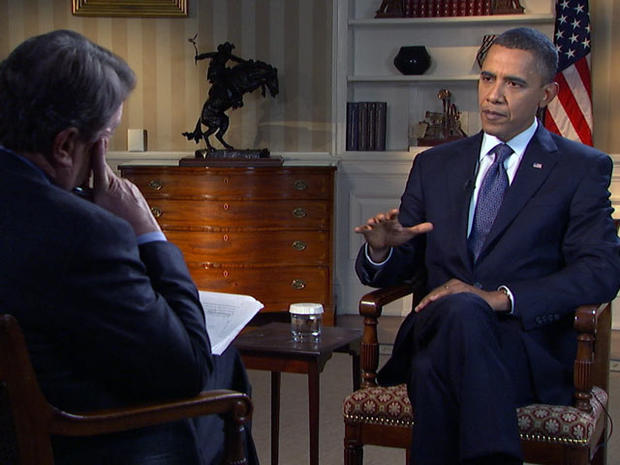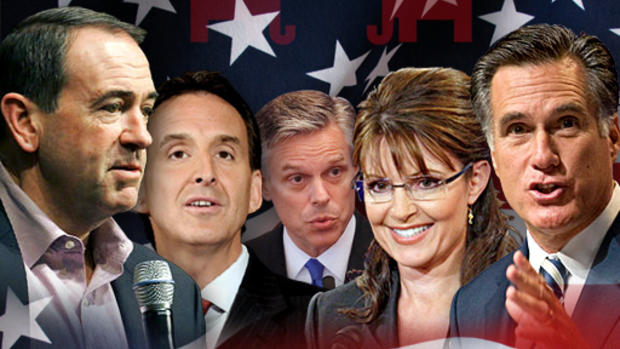Obama and the GOP Prepare for the 2012 Fight
In his "60 Minutes" interview with Steve Kroft, President Obama explained his view on how his administration and the Democratic party got "shellacked" in the midterm elections and what he plans to do to change course and re-energize his party. Meanwhile, the GOP is plotting its strategy to make Mr. Obama a one-term president.
Mr. Obama gave his rationale for why his party lost so many seats in the House and Senate. "So, people are looking and saying, 'Well government intervened a lot, spent a lot of money, and yet, I still don't have a job or my neighbor still doesn't have a job or that home is still being foreclosed down the block.' And our argument was, 'Well, we had to take these steps to stabilize the economy and things would be a lot worse if we hadn't taken these steps.' And people say, 'Well, you know what? That's not particularly persuasive to us.'"
Republicans were successful in painting Mr. Obama as a tax-spend-expand government president, and took advantage of his inability to connect with the voting public, especially younger voters and independents who supported him in 2008.
Obama On The Political Price of The Election
60 Minutes Overtime: The Full Obama Interview
"... the Republicans were able to paint my governing philosophy as a classic, traditional, big government liberal," Mr. Obama told Kroft. "And that's not something that the American people want. I mean, you know, particularly independents in this country. But I think most Democrats and Republicans, they want a government that works, but they want one that's lean. One that's not wasting money. One that is looking after their interests, but isn't engaged in a whole bunch of giveaways.
"And I think the Republicans were successful in creating a picture of the Obama Administration as one that was contrary to those commonsense, Main Street values about the size of government. And so, it I think it is fair to say that, you know, the American people don't want to see some massive expansion of government. And I think the good thing is that having gotten through this emergency, I think what people will see over the next two years is probably a better reflection of the kinds of long term priorities that I want to set for the country."Mr. Obama's admission that the Republicans successfully created a picture of his administration as big government out of control doesn't mean he thinks his policies and efforts to get through what he calls an "emergency" were flawed.
"We made the right decisions in making sure that we stabilize the economy. But in terms of setting the tone and how this town operates, we just didn't pay enough attention to some of the things that we had talked about. And, you know I'm paying a political price for that," he told Kroft.
In part, as some critics said, Mr. Obama didn't pay enough attention to creating a narrative that gave voters confidence that he could ease the economic pain of millions of Americans. Instead he often laid blame on the Republicans past and present for creating such a challenging set of problems to overcome.
In 2010 campaign speeches, he frequently used an analogy about how the Republicans drove the economy into a ditch.
"I've been using this analogy as I travel the country. Imagine the Republicans driving the economy into a ditch. And it's a deep ditch. It's a big ditch. And somehow they walked away from the accident, and we (Democrats) put on our boots and we rappelled down into the ditch. ... We've been pushing, pushing, trying to get that car out of the ditch," he said during a campaign speech in October.
"And meanwhile, the Republicans are standing there, sipping on a Slurpee. Fanning themselves. We're hot and sweaty and pushing, and they're kicking dirt into the ditch. Getting it into our faces. But that's okay. We said -- every once in a while we'd ask them, "Do you want to come down and help?" They'd say, "No, but you're not pushing the right way, though. Push harder."
Obama, GOP to Seek Common Ground over Slurpees?
In his column in the New York Times Sunday, Frank Rich summed up the president's dilemma:"You can't win an election without a coherent message. Obama, despite his administration's genuine achievements, didn't have one. The good news -- for him, if not necessarily a straitened country -- is that the G.O.P. doesn't have one either. This explains the seemingly irrational calculus of Tuesday's exit polls. Voters gave Democrats and Republicans virtually identical favorability ratings while voting for the G.O.P. They gave Obama a slightly higher approval rating than either political party even as they punished him. This is a snapshot of a whiplashed country that (understandably) doesn't know whose butt to kick first. It means that Obama can make a comeback, but only if he figures out what he has to come back from and where he has to go."
The Republican side now has to show America that it can do better than the Democrats at bringing back jobs and creating a less hostile environment in Washington. As GOP rainmaker and Fox News analyst Karl Rove told CBS News anchor Katie Couric in an interview, "Let's not kid ourselves, the Republicans are on probation. That's why they've got to do in office what they said they would do on the campaign trail when it comes to these big issues."
The Republican "Pledge to America" touted by future Speaker of the House John Boehner, however, was lacking in specifics, as is the Republican pledge to eliminate $100 billion from the federal budget.
When asked by Couric following the midterm elections about specific cuts the GOP would make, House Minority Whip Eric Cantor offered generalities: "We have put on the table an attempt to put discretionary spending back to 2008 levels, and that means an across-the-board reduction in spending."
Speaking to Kroft about spending cuts, Mr Obama said, "If you eliminate all the waste and abuse that people talk about eliminating -- you're still confronted with a fact that the vast majority of the federal budget are things that people really think are important--like Social Security and Medicare and defense.
"You then have to start making some tough decisions about how do we pay for those things that we think are important? And you know, we're not gonna be able to balance the budget just by slashing the National Parks budget, even if you didn't think that was a proper function of government. We're not gonna be able to balance the budget by eliminating the National Weather Service. We're going to have to tackle some big issues like entitlements that when you listen to the Tea Party or you listen to Republican candidates they promise we're not gonna touch."
The Republican leaders, with their new majority in the House, have chosen health care as the issue to challenge Mr. Obama. Cantor has called for the repeal of the bill, and Boehner has called it a "monstrosity."
On "Face the Nation" Sunday, Senate Minority leader Mitch McConnell told Bob Schieffer that the results of 21010 election meant that "people who supported us--political independents--want it repealed and replaced with something else. I think we owe it to them to try." The GOP will attempt to dry out the bill by limiting funding to provisions.
CBS News exit polling showed that 48 percent of the people want to repeal health care but 47 percent wanted to leave it as is or in fact expand it.
"I had to make a decision: do I put all that aside, because it's gonna be bad politics? Or do I go ahead and try to do it because it will ultimately benefit the country? I made the decision to go ahead and do it. And it proved as costly politically as we expected. Probably actually a little more costly than we expected, politically," he said.
Asked by Kroft if would pursue the same course with health care given the current situation, Mr. Obama replied, "You know I think what I would have done is to be more scrupulous about sticking to some of the commitments I had made in how to get it done. For example, I made a commitment that I was gonna make sure that the key negotiations around health care were on C-SPAN. And the truth of the matter is that, you know, you have five different committees over there that are working on it."
Moderating the tone of his 'car in the ditch' metaphor during his post-election press conference last week, Mr. Obama said, "We're still digging our way out of a pretty big mess. I don't think anybody denies they think we're in a ditch. I just don't think we feel like we've gotten all the way out of the ditch yet. I think what they want right now is Democrats and Republicans both pushing some more to get the car on level ground. And we haven't done that."
McConnell also moderated his tone somewhat on the subject of bipartisanship, but it's unclear what ground each side is willing give on issues such as health care and taxes.
"The notion that we're at each other's throats all the time is simply not correct. I've had two conversations with him this week about the way forward. We anticipate being able to do the people's business in those areas where we agree," he said on "Face the Nation."
The issue going forward will be if there are enough areas of agreement on big issues to avoid gridlock and a continuation of partisan hostilities that penalize the American people, who do not hold Congress in high esteem. In the 2010 election exit polls, Congress received an approval rating of just 25 percent, and 73 percent said they disapprove of the job Congress is doing.
A demonstration of cooperation in Washington in the next few months would send a signal that a bipartisan phase of American politics has grudgingly arrived. So far, any signals of serious bipartisanship remain elusive as the fight for the 2012 presidency takes center stage.


